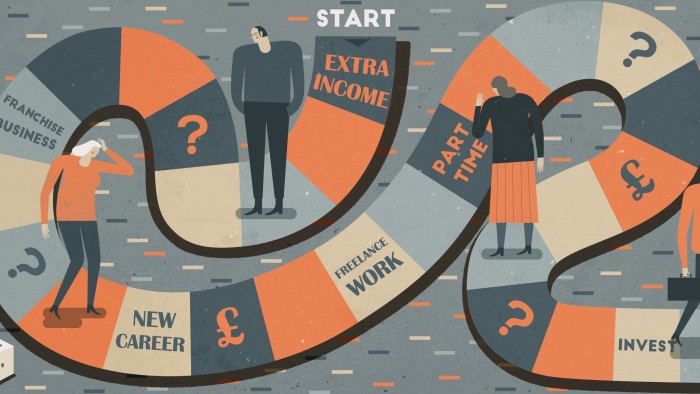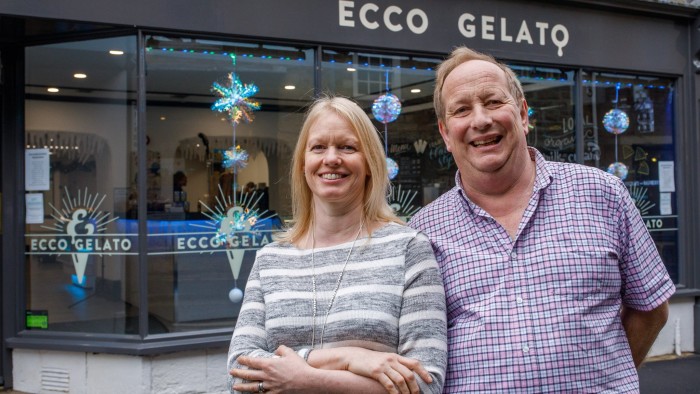Over-50s are the new business start-up generation

Roula Khalaf, Editor of the FT, selects her favourite stories in this weekly newsletter.
Age discrimination does not exist when you are your own boss. The growth in self-employment since 2000 has been fuelled by the over-50s who are finding it increasingly hard to find full-time work. With the sheer number of baby-boomers now approaching retirement age, the era of the “olderpreneur” is upon us.
Age may have dimmed their employment prospects, but older people often have the financial firepower to start up their own businesses — with the potential to embark upon a second career, doing something that they always wanted to do.
Pension freedoms have made it possible to access retirement funds from the age of 55, plus transfer valuations on final-salary schemes have soared in recent years. This means it is possible to access valuable lump sums — or even borrow against the value of a pension — in order to fund a new venture.
This was the chosen route of our cover stars Andrew and Philippa Tarling, both in their mid-50s, who have launched a successful gelato business which they hope will keep them busy — and turn a decent profit — in their retirement.
Others have started consultancies with redundancy payments. This is also the age when inheritances can arrive, with some opting to use these to start businesses.
Some older workers have turned to the franchise route, buying into a ready-made business and starting a branch in their local area. This was the choice of 64-year-old Steve Brown who took early retirement from a large IT company, but realised after a year that he was bored stiff. He is now running his own bookkeeping practice, and relishes his newfound flexibility.
Here, we present tales from the “oldies but goodies” who have carved out a new niche for themselves by starting their own business, plus examine how the UK workforce is changing, and present six ways that budding olderpreneurs could raise the funds to go it alone.
Disappearing trick
Workers over the age of 50 are an increasing rarity in the Square Mile. Lucy Kellaway noticed the trend in May. She was speaking to a group of 200 investment bankers when she found that only one of her audience was her contemporary. It was at odds with national statistics which showed that the number of workers over the age of 64 had doubled over the past decade.
Her FT column sparked responses from more than a hundred readers who had also become the newly “disappeared” or who were in their 50s and doing their best to hide their age.
One typical response was: “I was made redundant from a City firm four years ago in the wake of the crisis at age 54. It soon became clear that my chances of getting a similar job were close to zero, so I went down the self-employed route by buying a small engineering company. The past four years have been a rollercoaster, mostly great fun, and I have learned a lot — though not made much money. I was lucky to have the funds to do this. The moral of the story for high earners in their 30s and 40s is to save like mad while you can.”
Companies that sack high-earning employees in their fifties are making decisions based on cold calculation to improve their bottom lines. Most do not care that the person they have made redundant is not ready to retire and still has much to offer. Little wonder that talented rejects are now fighting back.
There were 4.6m self-employed people in the UK at the end of 2015 — up from 3.8m in 2008, according to ONS data. The over-50s account for 43 per cent of those who start their own businesses. However, they are much rarer in the workplace — less than a third of employees are over 50.
Furthermore, the number of self-employed people aged 65 and over has more than doubled in the past five years. By the age of 70, almost 60 per cent of those still in work are self-employed.
‘Selfies’ come into fashion
It is estimated that half of all jobs created since the financial crisis are performed by self-employed workers. Good news for the economy — but not necessarily for the workforce. The Resolution Foundation reported in October that self-employed workers had suffered a £60-a-week fall in income over the past 15 years.
For many, the dream of a leisurely retirement is replaced by the reality of needing to keep working and earning money. Yet there is increasing evidence that older people are finding the modern workplace a harder place to fit into.
According to Age UK’s “Later Life in the UK” report, published in December, there are 2.9m people between 50 and state retirement age who were not in employment. Only 700,000 of them regarded themselves as retired; however, 1.7m thought they were unlikely to work again.
The rising state retirement age for women has left many women out of work and without income. Between 2010 and 2014 the number of women over 50 who were unemployed rose by almost 50 per cent, while the rise in general unemployment was only 1 per cent, according to the pressure group Women Against State Pension Inequality (Waspi).
Not surprisingly, nearly two-thirds of older people believe discrimination exists in the workplace. The Age UK report says: “The self-employment propensity of almost all age groups has risen over this period, with the largest changes among those aged over 70.”
Full-time and part-time workers each account for about half of the rise in the absolute number of self-employed workers, but the growth rate of those working part-time has been much stronger. Part-time self-employment grew by 88 per cent between 2001 and 2015, compared to 25 per cent for those working full-time, according to ONS data.
The age of both part-time and full-time self-employed workers has risen disproportionately to the population as a whole over the last ten years. The number of self-employed over-50s working in the areas of finance and business services is especially high. They are concentrated in London and the south-east, and work broadly the same hours as employees.
Christopher Brooks, senior policy manager at Age UK, says that for some older professional workers it is increasingly accepted that becoming an industry consultant after leaving is a natural step. “They have a lot of expertise and experience and often, as they get older, they want to work flexibly,” he says.
“Part of the reason that people opt to become self-employed or set up businesses is that it is very difficult to get back into work when you are aged over 50. A lot of people over 50 really want to work. High-skilled professionals may also have a lump sum from redundancy to invest in a business.”
Pensions potential
Historically, low annuity rates make it financially impossible for many over-50s to retire early. But quantitative easing, low interest rates and pension freedoms have also produced a new source of funding for start-up businesses.
“A pension pot of £300,000 is likely to give you an annual income of £10,000 instead of the £40,000-£50,000 that people feel they need to live well. But that same pot of cash may be leveraged through pension-led funding to set up a business that could provide the income needed to live,” says Adam Tavener, chair of Clifton Asset Management, a specialist adviser.
Mr Tavener says that small businesses were poorly served by banks. Yet people who have money in pension pots could be investors in their own new businesses. For the borrowers, this was no riskier than taking a loan from a third party. But if the business fails, there will be a shortfall in the pension pot.
“Pension-led funding is not for everyone,” he cautions. “It works for older people because they have had the time to accumulate pension assets in employment. Most of our clients are 45 to 60, but we have helped people up to the age of 80.
“They need to kick the tyres of their business plan to make sure it is prudent and commercial.”
Income is not the only reason to set up a business; it could also be good for your health. Professor Dame Sally Davies, the chief medical officer, produced a report at the end of last year saying that those between the ages of 50 and 70 were healthier if they kept on working. Even the over-80s benefit. In November, 89-year-old former soldier, Joe Bartley, from Devon, advertised for a job because he was “bored”. He now works as a table-clearer in a local café.
For anyone considering starting out again, there is one very encouraging statistic. Businesses set up by the over-50s are more likely to still be trading five years later than those established by younger age groups. So the ranks of “olderpreneurs” look likely to swell further in the future.
Six ways to finance a second career in retirement
1 Pension-led funding
Instead of using a lump sum from your pension to fund a start-up business, it is possible to borrow against it. Pension-led funding can be used on small self-administered schemes (SSAS) to lend up to 50 per cent of the underlying funds to the business in a loan-back arrangement that has been available since 1979.
Your pension pot can be transferred into a SSAS structure, and then a loan can be made to a business. The business pays interest to the pension fund — usually at a much higher rate than a bank would charge — to restore the loan. Record transfer values currently available on final salary schemes mean it is not uncommon to be offered 40 times the equivalent annual income from a policy, giving huge scope to the would-be olderpreneur. However, anyone giving up secure income in retirement will need to obtain independent advice, which can be costly.
The transfer usually takes between six weeks and three months to complete the valuations and compliance work, plus HMRC permission needs to be gained to set up the scheme. If your pension money is with an independent pension provider, the process is relatively quick. With a final salary scheme, the process takes longer as the trustees satisfy themselves that it is in the scheme member’s interest to do so.
“As they are not taking anything out from the pension scheme but transferring it to another pension scheme, there is no tax to pay,” says Adam Tavener, chair of Clifton Asset Management, a specialist adviser in the sector.
Having set up the SSAS, Clifton remains a trustee of the pensions scheme to make sure the funding arrangement works into the future.
“We monitor repayments and if they are not paid on schedule we enter into a dialogue about rectifying, so we can reschedule,” Mr Tavener says. “If we think a business is struggling we will suggest an advisory organisation that can help them.”
Under pension-led funding, arranged by Clifton, less than 2 per cent of new businesses have failed and not repaid the pension. If the interest charge has been too high or the failure looks suspicious, HMRC can levy a tax charge if it thinks the scheme was set up to avoid tax.
And if the business is very successful and pays large sums back to the pension, it has to be careful not to exceed the lifetime allowance of £1m or punitive tax charges could apply.

2 Become a buy-to-let landlord
Many older people are confident that they understand the property market better than any other form of investment. They have bought properties for the rental yield and potential capital gains at a time of historically low interest rates on savings.
Just over 60 per cent of buy-to-let landlords in England and Wales are aged over 55, according to recent research by the London School of Economics for the Council of Mortgage Lenders. Twelve years ago, only 24 per cent were in this age group.
About half of the landlords had no debt at all, which means that they will not be affected by the government’s removal of higher rate tax relief on mortgage interest.
3 Set up a franchise business
Buying a franchise offers a ready-made route to setting up all kinds of businesses — from restaurants to sales to professional services companies — that can offer greater autonomy and flexibility to older workers. The number of franchise-owned businesses has grown by 10 per cent in the past two years to 44,200 and these businesses employ a total of 621,000 people.
Steve Brown, 65, of Thatcham near Newbury, Berkshire, took out a franchise with Rosemary Bookkeeping six years ago, a year after retirement. He had previously worked in IT as a global support manager with a large firm, and took early retirement at 58. “I did not plan to go back to work. I had enough to live on but I got bored after 12 months,” he says.
“My daughter, TJ, who had been an office manager, was coming off maternity leave and we went to a franchise show in Reading. I wanted something where I could work from home and there would be repeat business. I did not want to sell products. Rosemary Bookkeeping was the only thing that really fitted and we were impressed by the systems and team.
The initial cost of the franchise was about £15,000 and Mr Brown says he put more money into the business in the first year than he took out. He still chooses not to draw a very big salary, but his daughter is paid in full. They now employ five people.
In September 2016, Mr Brown won the British Franchise Association award for the olderpreneur of the year. By then he had a record of increasing revenues by 30 to 40 per cent a year. He has also set up a virtual office on Skype, and has saved clients money through automation.
The ability to work when he wants to has also been invaluable. “I get up when I want to, and work when I want to,” he says.
Two years ago when his wife was ill in hospital, he and his daughter were able to run the business around visiting hours, and also did some work from the relatives’ room. “It kept our minds off the immediate health issues,” he says.
4) Consider alternative finance
Older people with a plan to set up a business often have several sources of funding available to them. Those who have paid off their mortgages may be able to borrow using their home as security for the loan — though they are then at risk of losing their home and business if things turn sour. Franchisors often have links with a major bank that will provide a business loan.
Other olderpreneurs have been able to obtain funding via peer-to-peer lending platforms — where individuals prepared to lend money are matched with people or small businesses that high street banks would likely turn down for a loan — or crowdfunding websites. With the latter, those looking to raise funds need to be precise about their need for the cash and what it will be spent on. An important catch is that if you get most of the money promised by funders, but do not reach the target they set, then you get no money at all.
5) Get help from the government
A Start Up Loan is a government-backed personal loan for individuals looking to start or grow a business in the UK that can provide £500-£25,000 with interest fixed at 6 per cent per annum.
To qualify, you will need to submit a business plan, pass credit and eligibility checks and be starting a company or be in control of one that has been trading for less than 24 months (this can include a franchise operation). Usually, applicants are unable to secure finance from other sources.
You could also be eligible for the enterprise allowance. For those receiving benefits, including job seekers’ allowance, employment support allowance, income support or universal credit, the enterprise allowance can provide £1,274 over 26 weeks. More importantly, it gives access to mentors who help new entrepreneurs to complete their business plans over 12 months and also provides funding for small and medium-sized start-ups.
The mentors are most useful in helping new businesses to budget for tax and for overheads (particularly in less busy periods) helping to make sure that those founding start-ups can cover their costs, and are valuing their time properly. Franchise businesses can provide an additional layer of support.
New businesses that want to set up as a private limited company need to register with Companies House. They need a company name, a company address, at least one director and one shareholder and should receive a certificate of incorporation. Then they need to register for corporation tax within three months of starting the business. The cost of setting up a company typically costs between £12 and £100.
Some freelancers are encouraged by their financial advisers to set up a company so that they can employ their spouse or children and pay them a wage out of the profits, or even set up a pension for them.

6 Get started on auction sites
The British are said to be a “nation of shopkeepers”, but the rise of auction sites means that anyone can set up a retail operation from their kitchen table. A recent survey by Aldermore Group found that 56 per cent of over-55s who were able to generate some extra income did so via internet sales sites.
Raising money by clearing clutter was not their only objective. The research found that an increasing number of new businesses were started by the over-50s — perhaps picking up items cheaply at a car boot sale, then reselling to collectors at a much higher price online.
Low interest rates were cited as the main motive for doing so. “With returns from savings low and the cost of living rising, finding ways to supplement income elsewhere has become a necessity for many over-55s,” Aldermore says.
With the exception of very valuable collectibles, selling second-hand items online will not attract any tax liability. From April, the new digital tax breaks mean online traders can make up to £1,000 profit a year before they are liable to pay tax.

Case study: We poured our pension into selling gelato
After running a pub for 25 years, Andrew and Philippa Tarling decided they wanted to start a business that had a better future and would attract younger customers.
Mr Tarling is 57 and his wife is 55. The customers of their country pub in Horsington, Dorset, are mostly their age or older. They became acutely aware that public houses were closing every week in England and wanted an alternative.
After research, they hit on the idea of setting up the Ecco Gelato Italian ice cream business in nearby Sherbourne. They had seen a similar successful business in Derbyshire run by another pub landlord. They initially planned to lease the machinery to make the gelato but they received an inheritance and also decided to liberate Mrs Tarling’s pension so they could buy £100,000 of equipment.
The non-contributory pension built up when Mrs Tarling worked for a large investment bank between 1985 and 1991 would pay her £100 a week from the age of 60. When the couple first asked for a valuation of the fund they were told it was £80,000 but a year later, the valuation of the defined benefit pension had almost doubled.
“It meant the whole project became feasible,” says Mr Tarling. The pension fund was transferred to a small self-administered scheme (SASS) and their new business was able to borrow 50 per cent of the fund via pension-led funding after taking advice from Clifton Asset Management, a specialist adviser.
“The cost of the advice is quite expensive — like a lawyer or estate agent — but the expansion of the value of the pension pot made it all work,” says Mr Tarling. Now the business is set to pay back the pension fund while paying interest at 12 per cent.
The gelato business is open seven days a week and the couple already employ 25 staff. They are now looking at moving into wholesale and supplying local delicatessens.
After five years, they plan to repeat the exercise to set up a second gelateria and then a third. “The pub does not take two people to run it,” Mr Tarling says. “The new project is invigorating. It attracts younger people in the evenings and we are learning something new.”
Comments